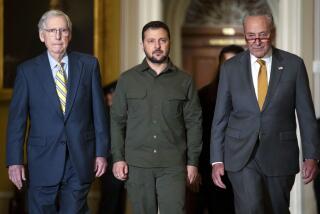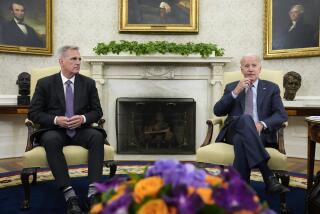Missing from Congress’ stimulus negotiations: transparency
- Share via
WASHINGTON — Upending Washington’s entrenched ways of doing business is proving tougher than President Obama may have assumed.
The nearly $800-billion stimulus bill served as a test case.
During the campaign, Obama released a position paper stating his commitment to open government. As president, he said, he would not only insist on transparency in his own administration, he would press Congress to revamp its practices as well.
Obama has no constitutional authority to set rules for Congress, but he suggested he would use his influence to see to it that Congress doesn’t conduct its work “in the dead of night and behind closed doors.”
In the first major piece of legislation pushed by Obama, transparency was missing.
Important negotiating sessions devoted to the stimulus took place in congressional offices, outside public view. Rep. Henry A. Waxman (D-Beverly Hills) said he was in a meeting about the stimulus plan Tuesday night in the office of House Speaker Nancy Pelosi (D-San Francisco). Among the participants was White House Chief of Staff Rahm Emanuel.
“We had to do some hard bargaining,” Waxman said.
The abundance of private deliberations made for some comical moments.
Rep. Dave Camp (R-Mich.) was walking through the Capitol on Wednesday on his way to a public meeting in which senators and House members were supposed to hash out differences over the stimulus. As he passed the Rotunda, Camp spotted Senate Majority Leader Harry Reid (D-Nev.) holding a news conference announcing that a deal had already been struck.
“This is the largest spending bill in the history of the United States, and I believe the public business should be done in public,” said Camp, who had been appointed to the 10-member conference committee created to reconcile differences between the two chambers.
“President Obama made that commitment repeatedly in his campaign,” he said.
Obama aides say that the president is still committed to transparency in government.
He reiterated the pledge during the transition, posting a promise on his website to “restore the American people’s trust in their government by making government more open and transparent,” and cited closed conference committee sessions as a practice ripe for overhaul.
But the White House isn’t apologizing for how the stimulus bill was handled. Given the dismal economic climate, White House aides said, the country needed a stimulus bill -- fast.
Press Secretary Robert Gibbs, asked about the private negotiations, said that Obama wasn’t troubled.
“He’s pleased with the process and the product that has come out,” Gibbs said while briefing reporters Friday. “I think when the process is done, the American people will be proud of the product that we believe and we hope will begin to stimulate the economy.”
Democratic leaders said the bill was handled according to procedures and customs that have been in place for years, including when Republicans controlled Congress.
Waxman said Congress’ treatment of the bill was fairly standard. Could Congress have demanded that all negotiations play out in public? Waxman said that would have been impractical.
“There are too many moving parts in this bill,” Waxman said. “We would be sitting in an open conference committee meeting for weeks, if not a whole month, to process all the amendments that would have been offered.”
--
More to Read
Sign up for Essential California
The most important California stories and recommendations in your inbox every morning.
You may occasionally receive promotional content from the Los Angeles Times.










